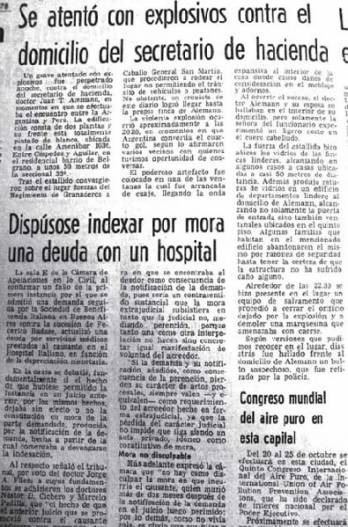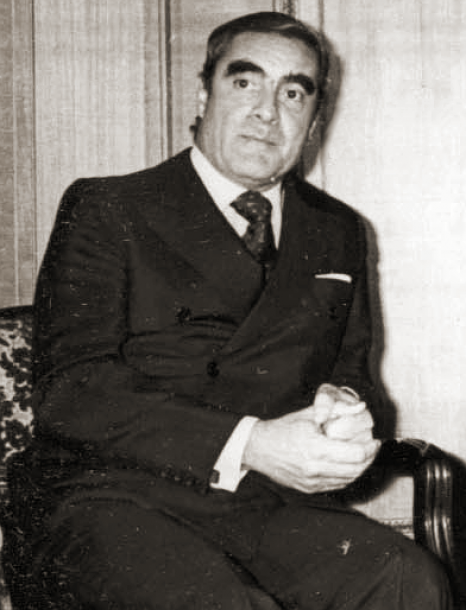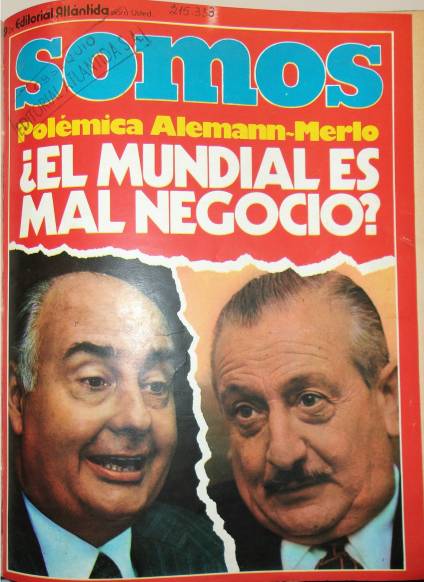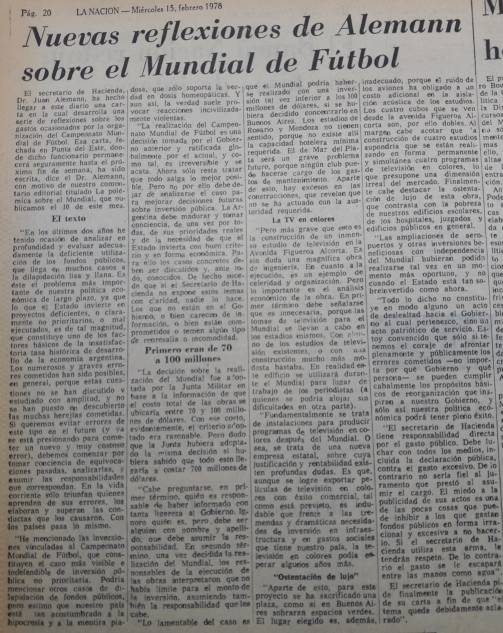La noche del 21 de junio de 1978, el por entonces secretario de Hacienda, Juan Alemann, recibió una advertencia de la que nunca más se olvidaría. A las 20.20, en el mismo instante en el que Leopoldo Jacinto Luque marcaba el cuarto gol contra Perú que clasificó a la selección argentina a la final del Mundial 78, una bomba con un kilo y medio de explosivos estalló frente su casa de la calle Amenabar 1024, en el barrio porteño de Belgrano.
La onda expansiva arrancó de cuajo la ventana de la planta baja y destrozó parte del living. El abogado, mano derecha del ministro de Economía José Alfredo Martínez de Hoz, salió ileso. En cambio, su mujer sufrió heridas leves. La detonación hizo añicos los vidrios de casi toda la cuadra. El ataque nunca fue reivindicado por nadie, pero a 40 años del hecho, Alemann asegura saber quién estuvo detrás: el almirante Emilio Massera.
 El atentado en la casa del ex secretario de Hacienda Juan Alemann fue noticia al día siguiente en el diario La Prensa.
El atentado en la casa del ex secretario de Hacienda Juan Alemann fue noticia al día siguiente en el diario La Prensa.
Las sospechas del exfuncionario de la dictadura tienen sus fundamentos. Para él, la bomba llevó el sello de quien era dueño de la vida y la muerte en la Escuela Superior de Mecánica de la Armada (Esma), y fue “un mensaje” que llegó desde el corazón de esa fuerza por sus recurrentes críticas a los gastos millonarios que realizó el Ente Autárquico Mundial (EAM) para la organización del campeonato de fútbol en el país.
“Massera ordenó que me maten porque me había metido con los gastos del Mundial”, aseguró Alemann en 2005 en una entrevista publicada en Revista Veintitrés. Lo mismo pensaba entonces. No lo podía decir abiertamente por obvias razones.
Aquellos días previos al Mundial, el extitular de Hacienda optó por hablar con los medios de comunicación, cansado de no poder controlar los gastos de su secretaría. El Ente Autárquico Mundial, a través del decreto 1261/77, disponía de fondos de libre disponibilidad, basado en “razones de urgencia”, y gozaba de “reserva en la difusión de sus actos”. Así llegó a gastar diez veces más de lo presupuestado originalmente.
Alemann estimó los gastos en “700 millones de dólares” y denunció que se trataba de “un disparate” para un país que se encontraba una situación económica tan delicada como la de Argentina. Sus declaraciones obligaron al titular del EAM, Antonio Merlo, y a su vice, el capitán de navío Carlos Alberto Lacoste —el verdadero hombre de poder dentro del organismo—, a dar explicaciones y rendir cuentas. Esto no cayó nada bien en un sector de la Junta militar, especialmente el que comandaba el almirante Massera.
La Armada había tomado el control del Ente Autárquico Mundial después de una feroz interna con el Ejército. A principios de 1976, Videla había nombrado a Omar Actis al frente del organismo, un general de bajo perfil, austero, que había llegado a jugar en las inferiores del River en la década del ‘40, bajo la conducción técnica de Renato Cesarini.
 Emilio Massera veía en el Ente Autárquico Mundial una plataforma para alimentar sus aspiraciones presidenciales.
Emilio Massera veía en el Ente Autárquico Mundial una plataforma para alimentar sus aspiraciones presidenciales.
La designación de Actis hizo volar por los aires los planes a largo plazo de Massera. El jefe de la Armada veía en el EAM una plataforma para alimentar sus aspiraciones presidenciales y el acceso a una caja que podía manejar a su antojo. Con Actis en el medio, todo lo que había tejido para quedarse con la organización caía por la borda.
Sin embargo, el problema se resolvió misteriosamente. El 19 de agosto de 1976, día en el que Actis convocó a una conferencia de prensa para explicar por primera vez su proyecto de obras para el Mundial, el general fue acribillado a balazos desde una camioneta Chevrolet verde que llevaba dos personas adelante y tres en la caja trasera.
Los asesinos arrojaron panfletos del “Ejército Revolucionario Montonero”, con consignas que no se correspondían a las que utilizaba por entonces la organización. La operación tuvo olor raro: uno de los atacantes le robó su reloj, papeles y dinero al general (algo inusual en el accionar de los pelotones armados que operaban en el país) utilizaron un vehículo pesado y lento, como si no estuvieran preocupados por la huida, y no fueron interceptados por ninguno de los retenes policiales que ese día se habían desplegado a lo largo de toda la ciudad. Las dudas hasta hoy apuntan contra Massera.
A partir de ahí, el EAM ‘78 hizo todo lo contrario a lo que proponía el general Actis. Se construyeron nuevos estadios en Córdoba, Mendoza y Mar del Plata; se remodelaron otros tres ya existentes (River, Vélez y Rosario Central); se levantó un nuevo edificio para la emisora Argentina 78 Televisora (A78TV), y se edificaron hoteles, rutas y nuevos sistemas de comunicación. Los gastos empezaron a fluir sin ningún control.
“La Junta Militar tomó la decisión de realizar el Mundial en base a información que consignaba que el costo de las obras se ubicaría en torno a los 70 y 100 millones de dólares. Y dudo que la Junta hubiera adoptado la misma decisión si sabía que todo esto llegaría a costar 700 millones dólares”, salió a decir Alemann por aquellos días.
Corrían los primeros meses del ‘78 y la polémica se instaló en todos los medios. El 10 de febrero, el diario La Nación llegó a publicar un editorial sobre el tema y días más tarde la Revista Somos, de Editorial Atlántida, que operó abiertamente en favor de la dictadura, le dedicó una tapa en su edición N° 74 con el título: “¿El Mundial es mal negocio?”.
 La tapa de la revista Somos, del 17 de febrero de 1978, sobre la polémica por los costos del Mundial.
La tapa de la revista Somos, del 17 de febrero de 1978, sobre la polémica por los costos del Mundial.
En una nota de cinco páginas, el secretario de Hacienda y el titular del EAM, con la participación de Lacoste, se cruzaron para dar su versión de los hechos e intentar convencer a los argentinos si servía o no hacer un Mundial, en un país donde la inflación había alcanzado el 18,7 por ciento en dos meses y la recesión golpeaba fuerte.
Allí, Alemann denunció que “el Mundial se infló” y que “hubo un exceso de gastos”. Dijo que el torneo “embarcó a todos los argentinos en un negocio que rendirá pésimos dividendos” y calculó que los costos totales llegarían a los 700 millones de dólares.
Merlo retrucó y reconoció el gasto de “500 millones de dólares”, alegando que buena parte de las obras eran de infraestructura y que quedarían para la posteridad. Destacó que el torneo se organizaba a partir de “una decisión política de la Junta Militar” y que no podía utilizarse “un criterio estrictamente numérico o financiero” para analizarlo.
“¿Cuánto cuesta en dinero demostrar que Buenos Aires es la capital de Argentina a mil quinientas millones de personas y cuánto que cinco mil periodistas informen al mundo sobre la realidad argentina, después de haberla visto?”, se preguntó Lacoste, queriendo darle un halo patriótico a su discurso, que coincidía con la “campaña argentina” que había puesto en marcha la dictadura. Lo cierto es que sus declaraciones escondían demasiado.
El Mundial en Argentina costó cerca de 521.494.931 de dólares, casi un 350 por ciento más que los 150.000.000 de dólares que demandó la organización de España ‘82.
El total representó la quinta parte de las reservas externas de libre disponibilidad con las que contaba el país en ese entonces; el dinero que se precisaba para construir 98 mil viviendas económicas, a un costo de cinco millones cada una, según estimaciones del secretario de Desarrollo Urbano de la Nación, Máximo Vázquez Llona; o 17 veces el presupuesto de la provincia de Santa Cruz, que rondaba los 30 mil millones.
“El Mundial no debió hacerse nunca”, sentenció el exsecretario de Hacienda. Sin vueltas, en una carta publicada en la página 20 de La Nación el 15 de febrero, Alemann aseguró que desde el 24 de marzo 1976 tuvo la ocasión de “analizar y evaluar la deficiente utilización de fondos públicos, que en muchos casos llega a la dilapidación lisa y llana”.
En ese texto consideró que los estadios de Rosario y Mendoza no tenían sentido “porque no existe allí la capacidad hotelera mínima requerida” para recibir a los seleccionados, los turistas y periodistas extranjeros. Que el de Mar del Plata sería “un grave problema futuro, porque ningún club puede hacerse cargo de los gastos de mantenimiento”. Y criticó a la construcción del inmenso edificio de ATC sobre la avenida Figueroa Alcorta.
“El lugar elegido es inadecuado porque el ruido de los aviones ha obligado a un costo adicional en la aislación acústica de los estudios. (...) La construcción de cuatro estudios supondría que se están realizando en forma permanente y simultáneo cuatro programas de televisión en colores, lo que presupone una dimensión irreal del mercado”, apuntó. “
La ostentación y lujo de esta obra —remarcó— contrasta con la pobreza de nuestros edificios escolares, hospitales, juzgados y edificios públicos en general.”
 La carta de Juan Alemann publicada en el diario La Nación con sus duras críticas a los costos del Mundial.
La carta de Juan Alemann publicada en el diario La Nación con sus duras críticas a los costos del Mundial.
Para resumir su idea, el exministro aseguró que las inversiones vinculadas al Mundial “constituyen el caso más visible e indefendible de inversión pública no prioritaria”. “Podría mencionar otros casos de dilapidación de fondos públicos, pero estimo que nuestro país está tan acostumbrado a la hipocresía y a la mentira piadosa, que sólo soporta la verdad en dosis homeopáticas. Y aún así, la verdad suele provocar reacciones incivilizadamente violentas”, escribió sin darse cuenta que esas líneas, leídas a distancia, anticiparían algo de lo que, paradójicamente, le sucedería cuatro meses después.
La noche del 21 de junio de 1978 ese vaticinio se transformó en realidad. Fue cuando Mario Kempes abrió la pelota a la izquierda, Oscar Ortiz metió el centro pasado al área y Omar Larrosa bajó la pelota al medio para Luque se metiera al arco con pelota y todo. En medio de los festejos, la bomba estalló en la puerta de lo de Alemann. Casualidad o no, el artefacto detonó en el mismo momento en el que Argentina se clasificó a la final.
Hoy Alemann se repite una pregunta: “¿Y si no hubieran metido cuatro goles, qué pasaba... se iban con la bomba a la casa?”.